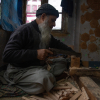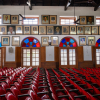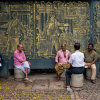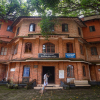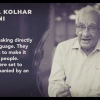M.K. Sanoo (b. 1928) is an eminent critic and scholar of Malayalam language and literature, who has taught at various colleges across Kerala for several decades. He has written books and articles on topics as diverse as biography, literary criticism, philosophy, children’s writings, translations, memoirs and travelogues. He was elected to the 8th Kerala Legislative Assembly that was in power from 1987 to 1991 as MLA, with the support of the Left front. He has served as the Chairman of the Library Advisory Committee during 1987–89, the Chairman of the Board of Studies, Kerala University, Sree Narayana Chair at M.G. University, the President of Purogamana Kala Sahitya Sangham, Kerala Sahitya Academy, and the Director, Sree Narayana Study Centre, Kerala University.
Some of his important works are Kaattum Velichavum (Wind and Light, 1960), Sahodaran. K. Ayyappan (1982, which received the SPCS Award for the best biography), Avadhaaranam (Ascertaining, 1984, which received the Kerala Sahitya Akademi Award for the best critical work), Changampuzha Krishnapilla: Nakshatrangalude Snehabhajanam (Changampuzha: the Beloved of Stars, 1988, which was awarded the Abu Dhabi Sakti Prize) and Mruthyunjayam Kavyajeevitham (The Immortal Poetic Life, 1997, which received the Asan Award for biography). He also received the Vayalar Award in 2001 and the Kerala Sahitya Akademi Award for total contribution to Malayalam Literature in 2005. In 2011, Sanoo Master was honored with the Kendra Sahitya Akademi Award for the biography titled Basheer: Ekantha Veedhiyile Avadhoothan, and the Ezhuthachan Puraskaram in 2013, the highest literary honour given by the Kerala government.
Following is the translated transcript of excerpts from the video interview with M.K. Sanoo conducted by Sahapedia in 2017 in Kochi.
On Sree Narayana Guru’s influence in his life
M.K. Sanoo: There are both personal and cognitive aspects to this answer. Once Guru had visited my ancestral home, called Mangalath, where I was born and brought up. That was before my birth. From my early days, I remember a lit lamp in the room where Guru had spent time. The family considered it a sacred space. They would leave the footwear outside, though there was not much footwear in usage then. My father told me that Guru, who was called Swamy then, was the one who said all people are the same. Since then, perhaps the devotion—though it is an irrational term—towards Swamy had grown and blossomed in my mind. Secondly, from childhood, the idea of hierarchy among human beings did not have any effect on me. People used to be called by caste names then. When I asked my father about this, he would say, somehow the system had evolved into this, but nevertheless, all human beings were the same and there should not be any sort of hierarchy among them. As I grew up, through my reading also I realised humans are more or less the same. At school, whenever my teachers showed discrimination, I would protest or express disagreement, albeit quietly. There was an orphanage attached to the school. I went to a Catholic institution. Children from the orphanage also attended the same school. There was one teacher who used to address these children as pazhankanji kudiyan (the one who eats old or stale food). He would pass remarks like, ‘Hey pazhankanji kudiya, why did you come to study?’ We all knew that at the orphanage the inmates were served stale food. One day it became unbearable for me, and I softly said to the teacher that his behaviour was a shame for all of us and he should not call them in this manner anymore. He asked me who I was to say this. I said I was no one but I said what I said because I was very sad about it.
So, I had a mind like that. That mind became stronger through thinking. When there occurred some caste-based quarrels where I lived, I felt very strongly against them. Hindu religion doesn’t call for it. The more I thought about it, the more I felt that the hostility between Hindu communities was stronger than the rivalry between Hindus and Muslims. When C.P. Ramaswamy Iyer was about to leave Travancore— I belong to Travancore—he said, ‘My primary effort was at uniting the Hindus. But, [I realised that] the mandan (stupid) Ezhava and the thandan (arrogant) Nair will never unite.’ The translation is not mine. What CP said in English was ‘the stupid Ezhava and the arrogant Nair’. Thus, the caste hostilities in my time were very intense. I had seen this in several fields. I understood that not only this hostility based on caste and religion would never help in leading the world to progress but it would also always be a barrier in that path. That is why I rejected it. There are two ways for this, either you could confront it head-on or you could do it in a language of friendship. I chose the latter.
On Sree Narayana Guru’s influence in his works (and thought processes)
MKS: In my childhood, I was surrounded by people who always raised the slogans of Guru. Slogans like Oru jathi, oru matham, oru daivam manushyanu (One Caste, One Religion, One God for all Humans). But what attracted me the most was his statement: The caste of a man is that of humanity. That statement grew in my thought process. I also used to read many other things. When I was studying for BSc, I would read literature on evolution, etc. So, when we read the works of Darwin, we found that at a particular phase of evolution humans begin to feel empathy towards one another. When I see someone fallen by the road, I am inclined to go to him and pick him up. The feeling that makes me do this, the feeling of brotherhood with him—that is called humanity. Humanity is the best thing to unify the world. We need to grow towards it. When I read about evolution—I am not sure if it was by Julian Huxley—the author talked about humanisation, and the step by step growth towards achieving it. We still have animals in us, at least partially. All the institutions like society, education and other social relations, etc., are for the humanisation of the animals inside us. It needs to be done continuously, I believe. This thought has influenced me deeply. When I stand in my class, if there are errant children, I need to make them grow towards being good humans. At the level of cognition, this is what inspired me the most.
On the Communist Party
In my immediate friends’ circle, almost all were communist party members or sympathisers. The Soviet Union was a significant topic in our discussions. One thing I could not agree with them on was the restriction of speech and expression there. Why would that be curtailed? All adults can vote. They should have the right to work in multiple political parties. Only a single party prevailed in SU. People have the ability to decide what democracy is. We used to debate a lot on this topic, but we never quarrelled. The party was very intense and even intolerant to some extent. I couldn't agree with them on this. This feeling intensified later.
I used to read all the giants of that period, like H.G. Wells, Bernard Shaw, Albert Einstein, etc. As I started reading widely, my perspectives widened and developed. What I agreed with the communist party was their international outlook. I always used to think of war as a terrible thing. War only encourages nationalism. When we say I am an Indian and all Indians are my brothers and sisters, my mind would protest. I would think, no, not just all Indians, but all Pakistanis and the Chinese and others are my brothers too. I don’t know how this idea took root in my mind. Even from those days, this idea was there. I was the one person who was amiable with students across all sections in my class.
On Kumaran Asan
Asan’s poetry was there in my life from a very early age. It was part of the daily prayers [at school]. Chanthameriya poovilum, shabalaabhamam shalabahathilum (In the pretty flower and in the beautiful butterfly) is a psalm. I didn’t know it then. Later, when I learnt it by heart, I learned the meaning. Many people don't ask about the meaning of things that they learn by heart. I used to want to know. In those days, all the prayers, bhajans and all ended with a sloka by Asan. I didn't realise it then. That shloka was this: Aakashangale anddaraashikalodum bhakshikkum aakaashamayi (Everything contained in this universe). This is the last sloka from his Prarodanam that describes God. In that sense, Asan fascinated me. Also, the lines like Gunamenni, oraalkkumennil ninnanayaayvaan tharamaakanam, vibho (Nothing other than good shall befall on the other from me). Anujeeviyilum sahodara pranayam twal krupayaale thonnanam (By your mercy, I should feel only kindness towards my fellow beings). These are by Asan. Ideas like these. Also, in Chanthameriya Poovilum words and imageries have merged together to depict the beauty of divine grace in the world. Asan’s poetry has touched me in that way. Like many others, I also read Veena Poovu (Fallen Flower). I learnt most of it by heart. Reading Nalini was intoxicating to me, I don’t know why. That is true even today. I have written about Nalini in bits and pieces. I have wanted to write about it comprehensively for a long time. But how much ever I try, it doesn’t get contained in my mind. It raises us to another level completely. I wrote about Leela last year. A bonding of that kind, it doesn’t emerge just from our thinking. Apart from the ideation aspect, Asan’s poetry touches some deep level of my mind and enraptures me. To me, Ezhuthachan is also like that. When I read certain sections of his poetry, I am stunned. I go back and read those parts I have learnt by heart again and again. In that sense, I believe there is an in-depth relationship between me and poetry. That’s how I turned to Asan as well. Even after reading all others, Asan’s unique approach and the grandiosity of his poetry attracted me. Especially, his thoughts on freedom. Sathyam shwasichum, samatwam.
On growing up in Kerala immediately after the death of Sree Narayana Guru and Kumaran Asan
There are practical differences to all these. There were two major communities where I grew up in Kerala. One is the Ezhava community and the other is the Latin Catholic community. There were a few Araya (fishermen community) families too. There were skirmishes between these communities, due to lack of unity, though I myself did not have such an attitude. The school I went to was a Christian convent. It enforced strict discipline and exercised severe corporal punishment. I was also beaten up a lot, for no reason. Usually, I was a decent student, a quiet kid. Others kids in my family were very noisy, but I was a very calm and quiet child. Teachers would ask me how I became like this despite coming from a family full of noisy kids! In the class, my attention would entirely be on what the teacher was teaching. This quality helped me thoroughly in my studies. Like a blotting paper, my mind would lap up whatever the teacher was saying. I could go and write exams straight away, I had such good memory. Hence, unlike others, I never had to struggle to study. But due to the punishment system, I disliked going to school. You are beaten up in front of everybody for no reason. I used to cry even when they beat my classmates. Pinching the ear tightly was also a mode of punishment. They had such punishment tactics in those days. Even today when some people argue against giving freedom to kids, I remember my school days. Students were the victims of the sadistic attitude of teachers then. I have always argued for creating an atmosphere of love and friendship in schools.
Secondly, we did not use to carry heavy loads of books, unlike today’s children, but we had quite some heavy portions to learn. History, geography, etc. I believe we need to establish a child-friendly ambience in schools first by reducing this load. I used to think this even then. My father would read out storybooks to me. He would narrate stories from the Ramayana and the Mahabharata. After he narrated some stories of Vikramaditya, I got interested and read it with great interest. Same with Arabian tales, Panchatantra, etc. Until recently I could recite some parts from these stories from memory. My father passed away unexpectedly. The last book he gave me was the Twenty-Three Tales by Tolstoy. It was a small book written for kids, but adults also need to read it. It was not easy for me to get books then. I had to walk three to four miles, equivalent to four to five kilometres today, just to meet up with people who had books, and soft talk them into lending me their books. I used to read a lot like that. I did not even have Asan’s works with me. They were there in my ancestral home. But I shifted home soon after my father’s death. Then the family situation deteriorated. I used to read amidst all this. But no one encouraged me to read. Same with writing. No one ever encouraged me. Some unknown force drew me to it, from an early age itself.
View on student politics and labour movements during his youth
I had sympathies towards the labour movement. The first labour strike happened in Alappuzha when I was seven or eight years old (1925–26). A few workers were killed in the firing. I have written about this in my autobiography. I had to cross a bridge to go to school, and the day after the incident, a friend showed me the place where this brutality occurred. Blood. There were no tarred roads then, we had only laterite roads. I could see pools of blood. I was scared to go closer. This haunted me deeply. I also got beaten up for no reason at school that same day. As I reached home I waited for my father to come. He was into the clothes business and he always returned home very late. I stayed awake waiting for him. My mother did not answer my questions. When I asked my father, he said the firing happened because the workers were not getting wages. Don’t you see our neighbours? They work from morning till evening, still, they are poor. They don’t have money to treat when their child falls ill. They are not paid wages for their work and they were fighting for that. My father explained these things to me in detail. That's how I grew closer to the labour movement.
Then, my first-grade teacher, R. Sugathan, later became a trade union leader and communist. He was a very pleasant person, unlike most other teachers. He would talk about not believing in religion and God. He would not explicitly say there was no God, but when we sang praises for the king, he would jokingly comment about its meaninglessness. After I left school, he became a trade unionist and joined the party. His influence was there in me. He never got married. He gave all his wealth to the party. He lived in the party office, with just two benches as furniture, even after twice being an MLA. That was there. I was ready to be an activist. But he said it would not suit my temper and behaviour. Had I gone down that path, I would not have passed BA. This is how the working-class movement attracted me.
When I was at University College, Thiruvananthapuram, the independence movement was brewing. I was never at the forefront of the struggle. But I was always a part of the crowd, participating in protests and demonstrations. I was uncomfortable with raising slogans, even in those days. I just used to go with the crowd as a participant.
On Changampuzha (Krishna Pillai), his poetry and his role in democratising literature
Just like Asan, Changampuzha’s poetry influenced me directly, not through anyone else. One reason for that was, from my young age itself, I used to think that life generally is very miserable. Even today, I get depressed at times for no reason. I don’t know why. This sense of sorrow for no particular reason troubles me even today. The meaninglessness of life. This attracted me to Changampuzha, I realise today. Our relationship began when I was in college. One of his poems— I think it was Spandikkunna Asthimadam—was published in Mathrubhumi. I really liked it. Thaarakangale kaanmitho ningal, thazhe ulloree pretha kuteeram. (Oh stars, can you see the haunted houses down below?) I could see these things with my eyes, I felt. I wrote an appreciation of the poem and sent it to him. I received his response in the next post itself. He wrote: ‘I generally do not pay any attention to what the critics are writing, but in your letter, I enjoyed the sweetness of pure appreciation of my poem.’ That’s how our correspondence began. He passed away soon after that. That letter… I should not say I just understood it, rather it was deeply etched in my mind. Through that, our relationship was cemented, unknown even to us.
He was someone who constantly doubted the reality of the world, you know, whether it was mithya (illusion) or not. I have similar concerns, about sathyam (truth) and mithya. One of his last poems goes like this. Let me recite it so that the idea becomes clear. Njanum vannu jagathil… I have also come to this world, why? I also ask that. Verutha, njanum vannu jagathil. Did I come to this world for nothing, just like dogs and cats, and live for some time and then die? Majjeevitham shoonyamo? If so, is my life empty? Then he asks his own talent—I do not have a talent like that—gaanaalaapna hrudayame—that’s his talent, right. ‘Nee nallapol nokku, nee kaanum kaazhcha yatharthamo, kapadamo, vibraanthiyo maayayo? (Check carefully, o my heart, what you see, is it real or fake or hallucination or an illusion?) This question was not clear in me. It became clearer through the poem. But this question about another possibility of reality was troubling me ever since. This world is beyond our regular reality. My mind was inclined to converse with this alternate reality, at least in dreams. That was there in Asan to a great extent as well. Those were like connections beyond a single lifespan. Kalidasa also attracted me thus. Life, as composed of human bonds, invisible and unknown to us, the force of karma that draws us together, the inexplicable connections is extremely complicated and wonderful, it seems. Changampuzha was trying to convey this wonder through his poetry, though not as grandly as Asan.
Changampuzha is interesting to me as a person also. Like a child throwing tantrum, throwing down her glass bowl and breaking it, he destroyed his own life, bit by bit. I saw the working of a romantic spirit in him, which also inspired me to write about him.
On Sahodaran Ayyappan (1889-1968, social reformer and thinker from Kerala)
I came to know about Sahodaran when he was beaten up and ant-nests were dropped on him by people attending Bharani (Bharani festival at Kodungallur Bhagavathi Temple) when he went to the festival and urged people not to attend it by singing Bharanikku pokalle sodarare (O my brothers, do not go for Bharani). Also, the news about how he arranged inter-dining, you know, dining together with members of lower-caste Pulaya, etc. He attracted me as someone who did such an adventurous act. I got acquainted with him later. I saw a baby-like innocent mind in him. I always cherish personal relations. He showered fatherly affection on me, and I became close to his wife also. But apart from this relation, I knew he was someone the society could use as a model figure. That’s how I wrote the book Sahodaran K. Ayyappan. Also, Guru said, One caste, one religion, one god for humans, and Ayyappan said, No caste, no religion and no god for humans. When Guru wrote Daivadashakam (10 verses for god), he wrote Science-Dashakam (10 verses for science). Guru loved him still. Ayyappan did not become a disciple. But while talking about Guru, he showed such respect, almost nearing Bhakti. I wrote about him in this context.
On Kesari Balakrishna Pillai
Like a pilgrim, I had visited Kesari a few times. The first time I went to North Paravoor, and walked along its streets and went and met him. I touched his feet and paid respects and conversed for some time. I returned to visit him a couple of times. What amazed me was that he had read my article, you know, I was very young then. Even an article by a very young writer was paid attention by him. Then I realised that he was the one who had led us through many unknown terrains, like painting and art, literature, psychology, history, etc. One thing that attracted me was what he said about poison-eaters. He said that writers are poison-eaters who eat the poison that has affected society. That idea too fascinated me.
On writer M. Govindan
Like Kesari, I went to meet M. Govindan out of my desire to meet him. The first book by him that I read was Anweshanathinte Arambham (The Beginning of Inquiry). The book begins with a narrative by Gotthold Ephraim Lessing. If God appears before me and asks if I need a complete truth or the desire to inquire, I would opt for the latter, by saying the former belongs to you. This attracted me instantly and I wanted to meet Govindan. He lived like a wanderer (I applied the same term for Vaikom Muhammad Basheer too), lived and communicated with the youth and renewed the dreams for a new world. Secondly, he always thought that power was dangerous. I also thought so. Power cannot be centralised. One of the many influences that destroy a human being is his affinity for power. That is a dangerous tendency. That’s a point where we agreed. Also, peace, and not war is the way forward, he believed. You Should Not Kill a Human, a voice that haunted me, was a play by him. Also, his vast, immense knowledge, his acquaintance with writers, etc., and his self-sacrifice ignited my respect and even adoration for him. He has contributed immensely to language.
On Vaikom Muhammad Basheer
The first time I met Basheer in person was when there was a meeting of Sahitya Parishad in Ernakulam. I travelled from Alappuzha to the venue. He was the one writer whom I wanted to meet as I had read his stories from childhood. When I asked where Basheer was, someone said he might be there at the bookstall. When I went there, Basheer was selling a speech by Kesavadev, for a few annas. There was no paisa then there was only anna. I approached him and asked why he was not going to the Parishad meeting. I did this without any hesitation. He replied, ‘Isn’t it for literary writers, what would I do there?’ That answer impressed me greatly. After that, we became very close.
On what attracts him to literature and writing
Tolstoy says the most important value in literature is honesty. I also believe the same. There are many who write to please readers and write about things they are not convinced of. It’s better to stand by one’s own idea and let people read it and think about it. That is one side of writing. On the other, when you write, we need to write in such a manner that the other person would understand it. That is also what a teacher thinks when he takes a class. I started my career, teaching in a school. I always focussed on that student who was considered to be the least smart in class. If he understood, then everyone would have understood. I think of writing in the same way. I use extensive quotations to make it clear. I cannot leave it obscure. Another thing, there is a rhythm dormant inside us, which is connected to our ideas. Our writing style will develop like that. Whether I should write ‘I met Govinda Menon when I went there’ or ‘When I went there, I met Govinda Menon’… these sort of thoughts occur to me. If I have sufficient time, I am careful with my writing. When I asked Basheer, he said he sometimes took even a week to write a paragraph. Madhavikkutty had the same issue. It is fine prose, right? That’s how it comes about. C.J. Thomas starts one of his writings thus: Egg is good; but if it decays, it gives off an unbearable stench. I asked him once, how do you write like this? He said he carried the idea for many days and started writing when this particular phrase occurred. Likewise, we will also reach there, if we keep meditating on things. There is a rhythm to it. An egg is good. The rhythm of his thought.
Views on literary criticism
Today the genre of literary criticism has become very complex through connections with other fields of knowledge, including sociology and political science. It is not merely literary criticism, it becomes more attuned to the elements of modern culture. But I do not agree with it. I have written about it... There is a book in English called Strangled Cry. If I remember correctly, it is written by John Strachey, I remember now. There are four great books… Through them, he conveys that democracy is good due to various reasons. It was the time of the Soviet Union. I cannot say it is a work of literary criticism. Literary criticism needs to be done using literary yardsticks. For that, a text needs to be read several times, again and again, to realise its essence and then you get to the nodal point of its terrain of sensibility. Like a flash. That flash is what can be written about, according to me. That is not what is being followed now.
On Mahatma Gandhi’s influence in his life despite being viewed as a Marxist thinker
Gandhiji was the strongest and greatest person in the twentieth century. He brought the entire country together and made us strong by wiping out our inferiority complex. It is said that someone once exclaimed to Guru that the number of the British presence in India was so small that they would be washed away by the spit of our population. Then Guru sarcastically asked if we would even have spit in our mouths when we saw the English. This was the direct result of our lack of confidence in ourselves. Gandhiji changed this and made us realise that India is a country richer and greater than any other country in the world, and we have so many things to be proud of. We should be proud of our tradition. He never thought about his own children. There are many people like that. He never thought about their life or future. Till the end of his life, he strove only for India’s future.
The concept of secularism that we talk about cannot be ensured only through law. It has to be lived. When he said his life is his message, it was right in his case. On the other hand, the ideas he presented for the progress of Dalit communities are not right or acceptable. I do not accept them. Gandhi did not understand their problems. It is Ambedkar who is right here. But in all other aspects, as an Indian in the twentieth century, he achieved the greatest position in the world, which cannot be easily achieved by anyone else. His dedication to ahimsa (non-violence) … his thinking that if you draw water from Ganga, the leftover water should be poured back to the river itself, because the water belongs only to Ganga and that people would need it for tomorrow also. In many such big and small ways, he is a personality with an aura of spiritual greatness.





